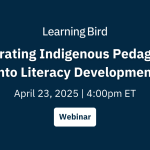Learning Bird’s First Book Club Meeting
Learning Bird recently started a book club focusing on books written by Indigenous authors or including Indigenous themes and issues. We just held our inaugural book club meeting to discuss Seven Fallen Feathers: Racism, Death, and Hard Truths in a Northern City by Tanya Talaga.
Challenges Facing Indigenous Learners
We were very excited to have a chance to come together and read books by Indigenous authors featuring Indigenous themes. Reading Seven Fallen Feathers first made sense, as many of us had heard about the book. We also knew that it was getting a lot of press and had won many awards. Our team worked with a few communities in the area. We wanted to learn more about the region and the challenges Indigenous learners face there.
Seven Fallen Feathers conveys the stories of the seven Indigenous youth who died in Thunder Bay between 2000 and 2011. Talaga delves into these youth’s personal lives and histories. She gives them names, faces, and depths of humanity and personality that enable readers to connect with them. Talaga successfully portrays the Thunder Bay area’s complicated geographic, political, and cultural climates. She provides context for Jordan Wabasse, Kyle Morrisseau, Curran Strang, Robyn Harper, Paul Panacheese, Reggie Bushie, and Jethro Anderson’s lives.
Book Club Thoughts and Impressions on Seven Fallen Feathers
After reading Seven Fallen Feathers at Book Club, here are some team members’ thoughts and impressions.
Daniel, Content Creator
Tanya Talaga’s writing impresses me on many levels. The aspect that marked me the most was the humanity that courses through her storytelling. Talaga describes a series of recurring patterns, tragedies, and systemic injustices without ever losing sight of the people and lives involved in them. In situations where police blotters and news articles tend to treat Indigenous victims as statistics or worse, Talaga puts equal focus on the hopes, dreams, and fears of each “Fallen Feather.”
Moreover, Talaga makes sure to document the tireless efforts and frustrations of the families, caretakers, and activists that the disappearance of youth continue to affect. In this way, Talaga emphasizes the all-encompassing impacts of racism and violence while renewing our collective responsibility to do something about it.
Kristen, Client Development Representative
Tanya Talaga’s extensive research in writing Seven Fallen Feathers: Racism, Death and Hard Truths in a Northern City allows readers to connect with the victims and families in the book readily. The level of detail she provides about the events surrounding the deaths of seven First Nations youth in Thunder Bay creates a vivid narrative that is at the same time impressive and disturbing. At the end of the work, I felt as if I knew some of the kids personally and had a glimpse into the pain their families endured.
Andrea, Senior Manager, Client Relationships
This was a very powerful book that artfully shared the tragic deaths of seven young people in and around the Thunder Bay region. The book is extremely well researched and written, giving the reader almost a bird’s-eye view of each student’s story.
Tanya Talaga draws you in with her descriptive writing, creating a strong connection with the learners and the challenges they faced coming to and living in the city. This book provides an eye-opening glimpse into the difficult choices many parents faced, and some still face today, in sending their children out of their communities to continue their education.I can see why this book has won several awards. It shares an important truth about systematic racism and highlights the barriers to education that continue to exist in this country for First Nations youth.
Henry, CEO
At first, I found it interesting to hear references to place names that are becoming familiar to us. Later, this apparent familiarity was more impactful when presented with the tragic histories and personal stories connected to these places.
I was most affected by the loneliness of these deaths. The individuals must have felt loneliness at being away from home and friends. The loneliness of isolation, and in many cases the loneliness of their deaths either at their own hand or at the hand of a stranger that saw them as the other. Even the loneliness of their body in the river struck me as a tragedy. And in many cases, the incompleteness that comes when we may never really know what happened to them in their final moments only added to their isolation in my mind.
This isolation, even when surrounded by people, as in the death of Robyn, profoundly affected me. The passing off of responsibility from friend to friend when out drinking on her last night, the dragging of her unconscious body through the snow by a friend, the callous and thoughtlessness of the racist slurs from the whites in the passing car, and the being stepped over by a cousin in the hallway. Always surrounded by others, always alone.
Rebecca, Education Account Lead
It seemed that every time I turned a page while reading Seven Fallen Feathers I was struck by a new thing. I was struck by the lack of clarity brought to any of the seven youth’s deaths. I was struck by the disdain others showed these young people, both in their lives and deaths. I was struck by how disturbing some of the scenes in the book were, and even more by how terrible it is that high school learners live through disturbing scenes like these.
I struggle to understand some of the actions taken by various people connected to these events. I struggle even more to understand some people’s reactions towards these young kids who find themselves at a loss in the big city for the first time.
I hope that this book will open the eyes of those whose job it is to create policy, decide and allocate funding, police the streets, and teach in schools. I hope that this book will open the eyes of everyone who sees an injustice taking place and give all Canadians a better look at our country. I hope that we will all stand up to find a way to help make this situation better together.
Joelle, Education Training Manager
As I was on the plane leaving Thunder Bay, I started reading this book and could not put it down. The wealth of information shared in this book demonstrates that institutional violence, as it relates to colonialism in Canada, is still alive today. Talaga brings each of the teenagers’ stories to life, weaving in their families, their lives, and the consistent failure of the system to support them before and after their deaths.
As I read through each of their stories, I was shocked and could not believe that I hadn’t heard of most of these tragic events. How did their stories not make the headlines? How can we trust the system to protect every Canadian citizen when institutional racism shapes it? The book is heartbreaking and infuriating, but it does bring to light the need for change. I would recommend this book in a heartbeat to all Canadians who care about our past and its effects on our present and future.
Future Book Club Selections
Have you read Seven Fallen Feathers as well? What were your thoughts? Please email us to share what stuck with you after reading it.
We read Bob Joseph’s 21 Things You May Not Know About the Indian Act: Helping Canadians Make Reconciliation with Indigenous Peoples a Reality for this month’s book club. We look forward to learning more about this complex and important piece of legislation impacting First Nations people and communities.
Are there specific things you think we should pay attention to or discuss while reading this book? Do you have a suggestion for a book we should read in the future? Please email us to let us know.








